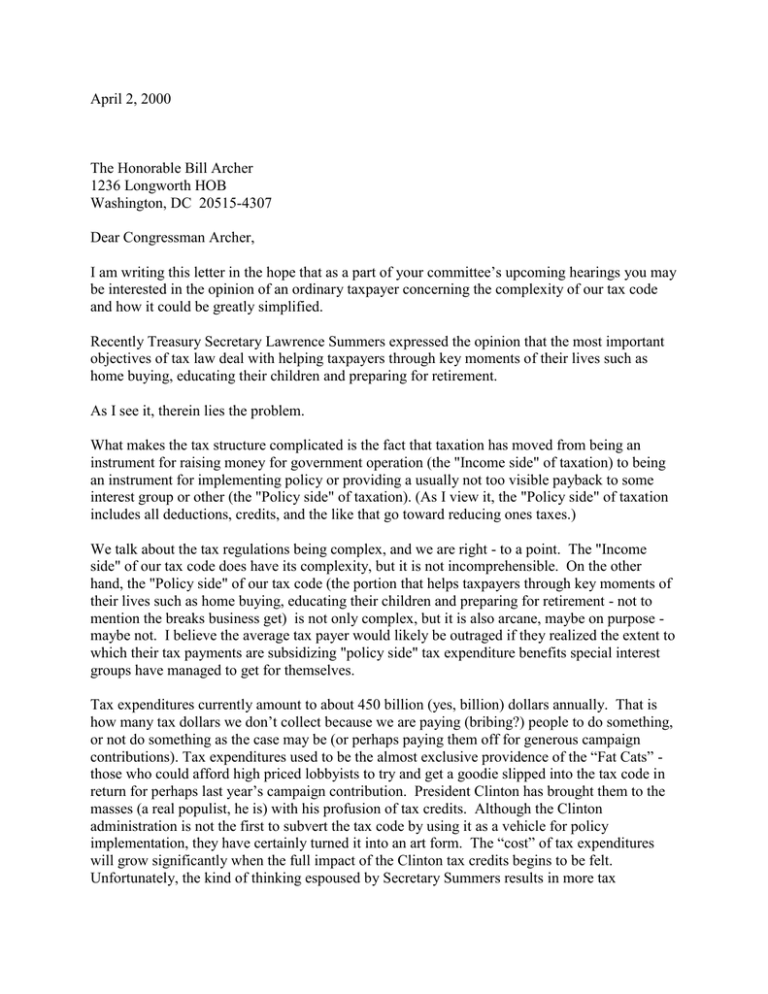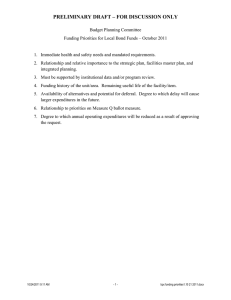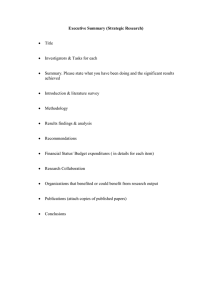April 2, 2000 The Honorable Bill Archer 1236 Longworth HOB
advertisement

April 2, 2000 The Honorable Bill Archer 1236 Longworth HOB Washington, DC 20515-4307 Dear Congressman Archer, I am writing this letter in the hope that as a part of your committee’s upcoming hearings you may be interested in the opinion of an ordinary taxpayer concerning the complexity of our tax code and how it could be greatly simplified. Recently Treasury Secretary Lawrence Summers expressed the opinion that the most important objectives of tax law deal with helping taxpayers through key moments of their lives such as home buying, educating their children and preparing for retirement. As I see it, therein lies the problem. What makes the tax structure complicated is the fact that taxation has moved from being an instrument for raising money for government operation (the "Income side" of taxation) to being an instrument for implementing policy or providing a usually not too visible payback to some interest group or other (the "Policy side" of taxation). (As I view it, the "Policy side" of taxation includes all deductions, credits, and the like that go toward reducing ones taxes.) We talk about the tax regulations being complex, and we are right - to a point. The "Income side" of our tax code does have its complexity, but it is not incomprehensible. On the other hand, the "Policy side" of our tax code (the portion that helps taxpayers through key moments of their lives such as home buying, educating their children and preparing for retirement - not to mention the breaks business get) is not only complex, but it is also arcane, maybe on purpose maybe not. I believe the average tax payer would likely be outraged if they realized the extent to which their tax payments are subsidizing "policy side" tax expenditure benefits special interest groups have managed to get for themselves. Tax expenditures currently amount to about 450 billion (yes, billion) dollars annually. That is how many tax dollars we don’t collect because we are paying (bribing?) people to do something, or not do something as the case may be (or perhaps paying them off for generous campaign contributions). Tax expenditures used to be the almost exclusive providence of the “Fat Cats” those who could afford high priced lobbyists to try and get a goodie slipped into the tax code in return for perhaps last year’s campaign contribution. President Clinton has brought them to the masses (a real populist, he is) with his profusion of tax credits. Although the Clinton administration is not the first to subvert the tax code by using it as a vehicle for policy implementation, they have certainly turned it into an art form. The “cost” of tax expenditures will grow significantly when the full impact of the Clinton tax credits begins to be felt. Unfortunately, the kind of thinking espoused by Secretary Summers results in more tax deductions and tax credits - more “Tax Expenditures” - more complexity. Tax simplification discussions invariably focus on the number of different tax rates and usually either say outright, or at least imply, that if we could only apply a single tax rate to income, our tax structure will be simplified. Implementation of a single tax rate will not, per se, simplify the tax system. Multiple tax rates are not what makes the tax structure complicated. Tax expenditures are what makes the tax structure complicated. Simplification of our tax structure will require "Truth in Taxation". The tax code must be used only to raise money for operation of the government. Policies must be implemented through the budget process. So called tax expenditures must become a thing of the past. If we opt for a tax structure that has no policy implementation (i.e. tax expenditures) in it, we have implicitly (if not explicitly) accepted the notion that there are no deductions, no credits and no distinction between "earned" and "unearned" income. Get rid of “long term/short term capital gain distinctions. Tax gross income (as depicted on lines 7 - 21, IRS Form 1040 - excepting line 10 which would, by definition, disappear)! Taxing gross income would permit us to significantly reduce the tax rate (rates) without compromising the amount of money collected. Yes, even the home mortgage deduction would disappear. (You know, the one that we use as a tax dodge when we consolidate all our personal debts into a home equity loan and then deduct the interest on it. Hmmmmmm....) Enter the Real Estate Lobby and the Banker's lobby. "Good grief! If you eliminate the interest deduction on housing, you will destroy the housing market!!!" Come now.... We did away with the deduction on credit card interest - and surely no one believes the credit card business has suffered much. We did away with the two (three?) martini lunch and the lunch crowd doesn’t seem to have thinned out much. Enter every other special interest with a story of doom and gloom - even though experience has shown that the sky will not fall!!! Additionally, there is a certain logic involved in taxing gross income. It goes something like this: America! The land of opportunity. The land of the Protestant Work Ethic, where if you work hard you get ahead. The land that has risen to its place of prominence in the world through the dedicated hard work of all its people. A response for those who would propose taxing only earned income goes something like this: If the "work hard and get ahead" rhetoric is really true, why, then, would we propose to tax earned income and not tax unearned income. What kind of motivation does that provide. What kind of motivation is it when we tax the income we work for and don't tax the income we didn't work for (at least in the traditional sense). Surely, we have it backwards. What we need to do is reward the work ethic and the people who "work" for their money by not taxing them, or for the most part taxing them at a fairly low rate. Not taxing "unearned income" is almost a slap in the face of the great work ethic that has made America the great country that it is. It is only after we have eliminated the tax credits, deductions, etc. that we can then argue over whether we should have a single flat rate or whether we should have graduated tax rates which would probably be more palatable to most taxpayers. They are less regressive than either a flat tax or a national sales tax, which is one of the alternatives that is frequently discussed. (Trying to make a national sales tax less regressive would likely end up with a situation that is as incomprehensible as the current income tax code - something that we don't really need.) Regardless which way we decide to go, there must be a special provision applied to very highly paid people. At some point the amount of income individuals receive for their "work" (or "play" in the case of sports people) becomes so outlandish that it must be considered obscene. How would we define obscene in this context? Simple. Any income that is greater than some multiple (pick one) of the amount we pay the President of the United States is obscene. For example, the income of basketball players who make one million dollars a month for playing and another two million per month for endorsements could well be considered obscene. (The amount their agents siphon off is also very likely obscene.) Obscene income should be taxed at a steeply graduated rate. Income that is not obscene would then be taxed at the flat or graduated rate applicable to everyone else. The key to tax reform is acceptance by the American public. The most likely way to earn that acceptance is by convincing the public that no one is getting an advantage. The best way to achieve that is by eliminating policy implementation - and the inherent unfairness that tax expenditures engender - from the tax code. After we get a handle on the tax code, we should then take on the Federal Government's budget process. But that is another subject for another day. For now, suffice it to say that the injection of a little integrity into the budget process wouldn't hurt it a bit. Sincerely, James Bispo 995 Little Creek Rd. Ext. Belhaven, NC 27810



